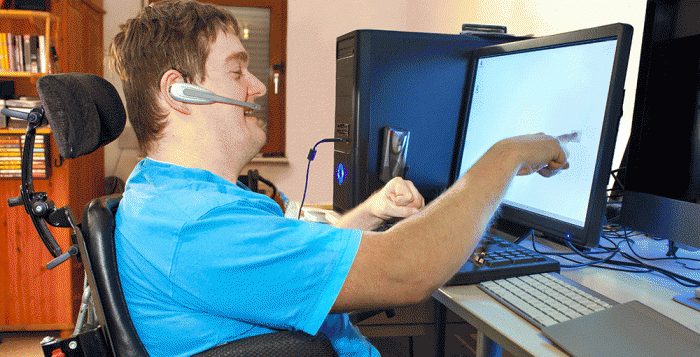People with Disabilities
RCPA Member Skills of Central PA Helps People With Disabilities Find & Succeed at Local Jobs
People With Disabilities Are Being Left Behind in the Vaccination Push
FEMA Holds Stakeholder Call on Independent Living for People with Disabilities
Join the FEMA Office of Disability Integration and Coordination (ODIC) on July 21, 2021 at 11:00 am–12:00 pm ET to observe the 31st anniversary of the Americans with Disabilities Act, focusing on Independent Living for people with disabilities.
- Register online
- Participant Phone Number: 888-204-4368
- Participant Passcode: 6980376
- Closed captioning (Event #4833864)
July marks the 31st anniversary of the signing of the Americans with Disabilities Act (ADA). This sweeping civil rights legislation expanded on the Rehabilitation Act of 1973 that prohibits discrimination against people with disabilities by federally-funded entities. The ADA covered all aspects of public life, prohibiting discrimination against people with disabilities in employment (Title I), state and local government services (Title II), public accommodations (Title III), and telecommunications (Title IV). Its provisions cover more than 56 million Americans, or approximately 20 percent of the U.S. population, who have a disability.
Learn how FEMA and the National Council on Independent Living work to provide equity and support independence by integrating the needs of people with disabilities into emergency management planning.
Speakers*
Linda Mastandrea
Director
FEMA Office of Disability Integration and Coordination
Reyma McCoy McDeid, MA
Executive Director
National Council on Independent Living
*subject to change
More information on this topic:
New Tool Makes Computers Easier to Use For People with Disabilities
StudyMoney.us and Other Financial Education Resources for People with Disabilities
June’s Money Talks webinar will wrap up the series by discussing StudyMoney.us and Other Financial Education Resources for People with Disabilities — scheduled for Wednesday, June 23, 2021, from 1:00 pm–2:00 pm. Learn more and register here.
Join us to learn about StudyMoney.us, an exciting new financial education website for people with disabilities and families that makes learning about money management fun, effective, and engaging!
StudyMoney.us was originally created in 2017 as a companion to Pennsylvania Assistive Technology Foundation’s book, Cents and Sensibility: A Guide to Money Management, the first comprehensive financial education curriculum developed specifically for people with disabilities. The newly rebuilt StudyMoney.us, launched in May 2021, features new content, a new look, full accessibility, and activities and quizzes to motivate and challenge learners.
Attendees will learn about:
- The content covered in StudyMoney.us and why this information is important for the disability community;
- How StudyMoney.us can best be used by both learners and instructors;
- Fun, informative, and interactive activities available on StudyMoney.us;
- Additional financial education resources available for both learners and instructors; and
- A case study using StudyMoney.us and Cents and Sensibility with college students with disabilities.
This webinar is part of Money Talks, a free series hosted by Pennsylvania Assistive Technology Foundation on financial empowerment for people with disabilities. If you are a person with a disability, a family member of someone who has a disability, an advocate, an educator, or a service provider, this series is for you. Sessions will include 30-45 minutes of interactive learning and 15 minutes for questions. Each session will be fully accessible, and recordings and slides will be made available.
Learn more, view previously recorded webinars, and register for this month’s webinar at PATF — MoneyTalks.
StudyMoney.us and Other Financial Education Resources for People with Disabilities
Wednesday, June 23, 2021 from 1:00 pm–2:00 pm
REGISTER
Join us to learn about StudyMoney.us, an exciting new financial education website for people with disabilities and families that makes learning about money management fun, effective, and engaging!
StudyMoney.us was originally created in 2017 as a companion to Pennsylvania Assistive Technology Foundation’s book, Cents and Sensibility: A Guide to Money Management, the first comprehensive financial education curriculum developed specifically for people with disabilities. The newly rebuilt StudyMoney.us, launched in May 2021, features new content, a new look, full accessibility, and activities and quizzes to motivate and challenge learners.
Attendees will learn about:
- The content covered in StudyMoney.us and why this information is important for the disability community;
- How StudyMoney.us can best be used by both learners and instructors;
- Fun, informative, and interactive activities available on StudyMoney.us;
- Additional financial education resources available for both learners and instructors; and
- A case study using StudyMoney.us and Cents and Sensibility with college students with disabilities.
This webinar is part of Money Talks, a free series hosted by Pennsylvania Assistive Technology Foundation on financial empowerment for people with disabilities. If you are a person with a disability, a family member of someone who has a disability, an advocate, an educator, or a service provider, this series is for you. Sessions will include 30-45 minutes of interactive learning and 15 minutes for questions. Each session will be fully accessible, and recordings and slides will be made available.
Learn more, view previously recorded webinars, and register for this month’s webinar at PATF.
Dems Test Infrastructure Pitch With Expansion of Services for Seniors, People With Disabilities — RCPA Member Achieva Featured
Biden Pandemic Strategy Puts Focus on People with Disabilities
Casey to Introduce Reform Bills on Law Enforcement Interactions with People with Disabilities
Washington, DC – Following violent interactions in Pennsylvania and throughout the nation, including the killing of Walter Wallace, Jr., US Senator Bob Casey (Democrat-Pennsylvania) will introduce two policing reform bills that would change the way law enforcement engages with people with disabilities. Among other reforms, Casey’s proposal would enhance state and regional 211 call systems, diverting some non-criminal emergency calls away from 911.
Senator Casey will host a virtual press roundtable with family members of people with disabilities who have faced violence at the hands of police, members of law enforcement, and other advocates. Senator Casey’s policing reform initiative – the Law Enforcement Education and Accountability for People with Disabilities (LEAD) Initiative – is comprised of two bills that address racial justice and the high incident rate of police violence against people with disabilities. They are the Human-Services Emergency Logistics Program (HELP) Act and the Safe Interactions Act.


















